
1517 Martin Luther posts 95 theses:

On this day in 1517, the priest and scholar Martin Luther approaches the door of the Castle Church in Wittenberg, Germany, and nails a piece of paper to it containing the 95 revolutionary opinions that would begin the Protestant Reformation.
In his theses, Luther condemned the excesses and corruption of the Roman Catholic Church, especially the papal practice of asking payment—called "indulgences"—for the forgiveness of sins. At the time, a Dominican priest named Johann Tetzel, commissioned by the Archbishop of Mainz and Pope Leo X, was in the midst of a major fundraising campaign in Germany to finance the renovation of St. Peter's Basilica in Rome. Though Prince Frederick III the Wise had banned the sale of indulgences in Wittenberg, many church members traveled to purchase them. When they returned, they showed the pardons they had bought to Luther, claiming they no longer had to repent for their sins.
Luther's frustration with this practice led him to write the 95 Theses, which were quickly snapped up, translated from Latin into German and distributed widely. A copy made its way to Rome, and efforts began to convince Luther to change his tune. He refused to keep silent, however, and in 1521 Pope Leo X formally excommunicated Luther from the Catholic Church. That same year, Luther again refused to recant his writings before the Holy Roman Emperor Charles V of Germany, who issued the famous Edict of Worms declaring Luther an outlaw and a heretic and giving permission for anyone to kill him without consequence. Protected by Prince Frederick, Luther began working on a German translation of the Bible, a task that took 10 years to complete.
The term "Protestant" first appeared in 1529, when Charles V revoked a provision that allowed the ruler of each German state to choose whether they would enforce the Edict of Worms. A number of princes and other supporters of Luther issued a protest, declaring that their allegiance to God trumped their allegiance to the emperor. They became known to their opponents as Protestants; gradually this name came to apply to all who believed the Church should be reformed, even those outside Germany. By the time Luther died, of natural causes, in 1546, his revolutionary beliefs had formed the basis for the Protestant Reformation, which would over the next three centuries revolutionize Western civilization. (History.com)
[Note: The Protestant Reformation in Germany would eventually give rise to the Thirty Years War, which left Germany—Prussia in particular—devastated, and divided between Catholic and Protestant states. Although Bismarck succeeded to a large extent in uniting Germany into an Empire, the process was not completed until Hitler came to power.—Ed.]
1833 (October 31–November 15): A US military force invades rebellion-torn Buenos Aires, Argentina, to protect American interests; the scenario will repeat itself in 1852, 1853, and 1890.
1887 Birth: Chiang Kai-Shek is born:
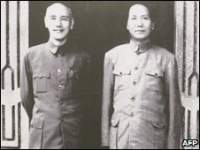
On this day in 1887, in Chekiang province, China, Chiang Kai-Shek, leader of the Nationalist government of China from 1928 to 1949, is born. As a young man training in the Japanese military, Chiang was converted to the ideals of republicanism. Upon returning to China, Chiang fought against the dying Manchu imperial dynasty. He eventually joined forces with Sun Yat-sen's Nationalist Party, or Kuomintang. Both Sun and Chiang became enamored of Soviet communism and even reorganized the Nationalist Party based on a Soviet model. Upon Sun's death, Chinese communists, who had been admitted into the party, came into conflict with strict republicans. It was at this point that Chiang's political shrewdness came to the fore, as he stemmed the influence of the communists in his party while keeping Moscow as an ally—that is, until Chiang led a coup that expelled the communists, feeling that they were too strong a challenge to his own control of the party. Chiang then lead the Nationalists in a march on Peking, eventually forming a new government under his control.
Unifying the country and keeping it from communist control were now most important to Chiang, even more important than his supposedly treasured social reforms or the invasion of Manchuria by Japan, which he did little to resist. But when full-blown war with Japan broke out in 1937, he was compelled to join forces with his communist enemies in order to repel further Japanese encroachments. China fought alone against the Japanese for four years, until the Allies declared war in 1941. Although the Allies hailed Chiang as the salvation of his nation, depicting him as a David against the Japanese Goliath, he was in fact a shortsighted tyrant who was more interested in maintaining his power base and privileges than fighting Imperial Japan. He resisted the attempts by U.S. Gen. Joseph Stilwell to create a modern Chinese army that would fight under joint Allied-Chinese control. He was more interested in getting hold of Lend-Lease money for his own purposes.
Upon the Allied defeat of Japan, Chiang returned to his battle against Mao Tse-tung and the communists. In 1949, he lost his nation to communism. Chiang removed himself to Taiwan, where he set up a relatively benign dictatorship—an alternate China. (History.com)
1892 The Adventures of Sherlock Holmes published:

On this day, The Adventures of Sherlock Holmes, by Arthur Conan Doyle, is published. The book was the first collection of Holmes stories, which Conan Doyle had been publishing in magazines since 1887. [For further details, Click here. Note: More people in the United Kingdom believe that Sherlock Holmes was a real person than believe that Winston Churchill was.—Ed.]
1895 Birth: Basil Liddell Hart: British military historian who is considered to have greatly influenced the development of armored warfare in the 20th century, and strategic theory. [For further details, Click here.]
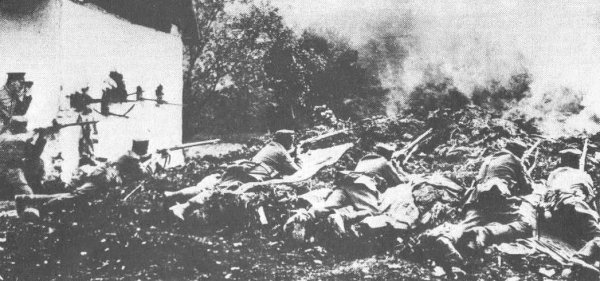
World War I: German forces capture the high ground overlooking Ypres. After their defeats at the First Battle of the Aisne and First Battle of the Marne, the Ypres campaign becomes the culmination point of the war of movement known as "The Race to the Sea". Referred to as "First Ypres" by the British; Langemarck—a village located about four miles north-east of Ypres by the Germans—or La première bataille d'Ypres (or bataille de Flandres--the Battle of Flanders) by the French, the battle will ultimately prove indecisive. As a consequence, trench warfare begins to dominate the Western Front. The Germans sometimes refer to the First Battle of Ypres as "The Massacre of the Innocents of Ypres" (Kindermord bei Ypern) because most of the German casualties are a mixture of young, inexperienced, and ill-trained trained reserve units, of which the List Regiment is representative.
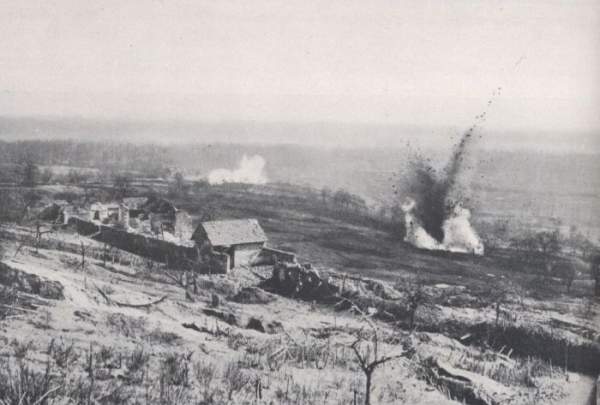
List Regiment (Oct 29-31): Infantry Recruit Adolf Hitler's 1st Company, 16th Bavarian Reserve Infantry, temporarily attached to the 54th Reserve Division, see their first action on the Yser this day, when they are sent forward to relieve a hard-pressed unit. With English and Belgian shells falling all around, Hitler's company advances and retreats four times before eventually taking their assigned objective. The battle continues for three days, with fierce causalities on both sides. [For further details, Click here.]
1915 World War I: From an article which appeared in the Paris Mail on the first anniversary of the First Battle of Ypres. The editorial article essentially comprised a celebration of the British Army's prompt action in saving the Channel ports from falling into German control.
If it is ever permissible to speculate shudderingly on what might have been if certain events had or had not happened, it is clearly justifiable to declare that at 2 o'clock on October 31, 1914, the fate of Europe was decided. It was the crucial hour of that heroic day. It is the hinge upon which the future history of the world turns. Today we celebrate the triumphal but bloody anniversary of the first battle of Ypres. We have lived through vivid, valorous months and years, we have watched battle after battle, terrible, intense, full-fraught with significance; and we have not even yet, in the vortex of events, realized how supreme was the crisis through which we passed three years ago, and how frightfully our fate trembled in the balance. [For further details, Click here.]
Click to Enlarge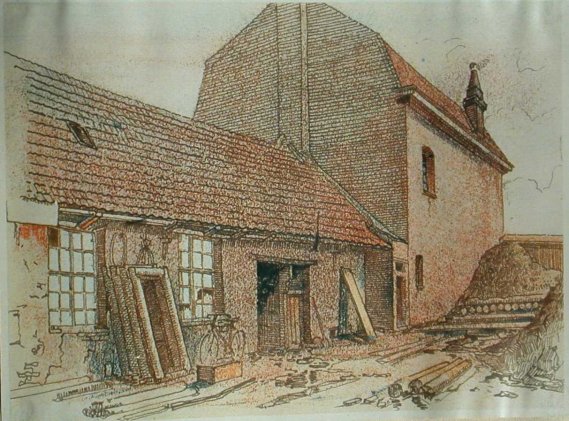
Fromelles Watercolor, 1915, by Hitler
World War I (Oct 4, 1915 - Feb 29, 1916): Gefreiter Adolf Hitler's serves with 16 Reserve Infantry Regiment at Fromelles. [For further details, Click here.]
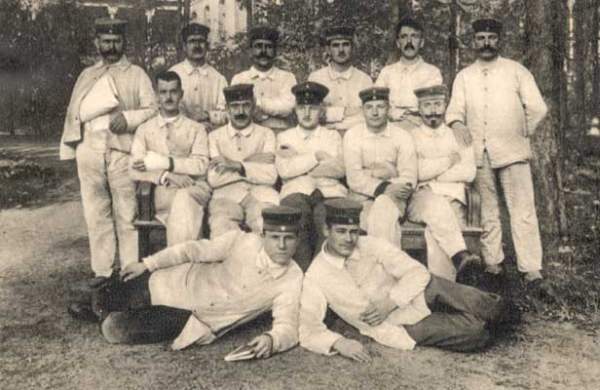
1917 World War I: Third Battle of Gaza:

Early on the morning of October 31, 1917, Allied forces under General Edmund Allenby launch an attack on Turkish positions at Beersheba, in Palestine, beginning the Third Battle of Gaza. [For further details, Click here.]
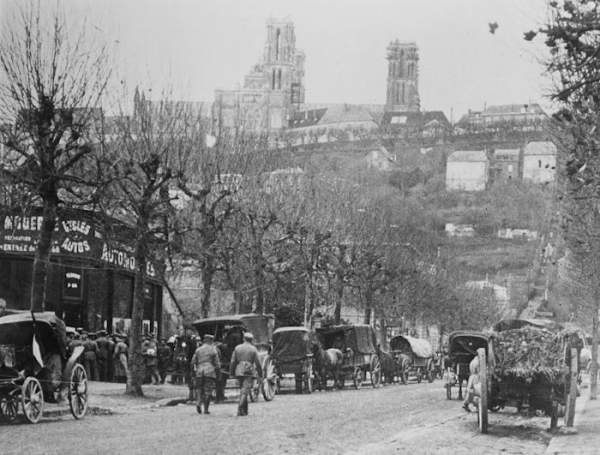
1918 World War I: Various:
Pershing's First Army punches through most of the third and final German line in France.
Italian reinforcements exploit the ever-widening gap at Sacile, and Austrian resistance collapses.
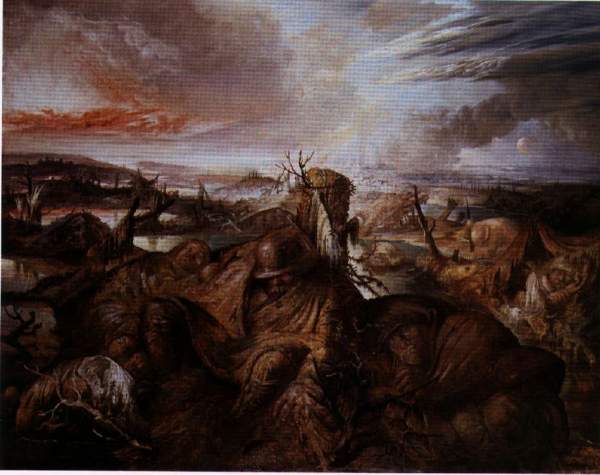
Gefreiter Adolf Hitler blinded in a gas attack near Werwick on Oct 14, recovers in the Prussian Reserve Hospital at Pasewalk near Berlin. The doctors at this army hospital, on the cutting edge of medical treatments for gassed soldiers, provide Hitler with very good care, and his sight slowly and painfully begins to return to him over these few weeks. Hitler falls into a deep depression. After over four years on the front lines, his fighting days are over. In four years of war, the List Regiment has lost 3,754 dead, 8,795 wounded, with 678 taken prisoner. This is somewhat above the average for the German Armed Forces as a whole. [For further details, Click here.]
1926 USA: Houdini is dead: Harry Houdini, the most celebrated magician and escape artist of the 20th century, dies of peritonitis in a Detroit hospital. Twelve days before, Houdini had been talking to a group of students after a lecture in Montreal when he commented on the strength of his stomach muscles and their ability to withstand hard blows. Suddenly, one of the students punched Houdini twice in the stomach. The magician hadn't had time to prepare, and the blows ruptured his appendix. He fell ill on the train to Detroit, and, after performing one last time, was hospitalized. Doctors operated on him, but to no avail. The burst appendix poisoned his system, and on October 31 he died. [For further information, click here]
1933 USSR: The Soviet Government merges the GIRD organization with the Gas Dynamics Laboratory (GDL) in Leningrad. The merger creates the Jet Propulsion Research Institute (RNII), headed up by the military engineer Ivan Kleimenov. This merged group contains a number of people who are enthusiastic proponents of space travel, including Valentine Glushko. Sergey Korolyov becomes the Deputy Chief of the institute, where he will lead the development of cruise missiles and of a manned rocket-powered glider. (Harford)
[See: Wunderwaffen: Hitler's Deception and the History of Rocketry.]1938 Poland: Foreign Minister Beck instructs Ambassador Lipski to negate Ribbentrop's proposals.
1939 World War II: Various:
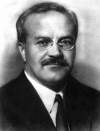
Viacheslav Molotov boasts: "One swift blow to Poland, first by the German Army and then by the Red Army, and nothing was left of this ugly offspring of the Versailles Treaty!"
Church and Reich: Oct-Nov During this period 214 Polish priests are executed, among them the entire cathedral chapter of the bishopric of Peplin. (THP)
Phony War: Oct-April Following Hitler's speedy victory in Poland, a period known as the Phony War, OR 'Sitzkreig,' follows in western Europe. Hitler proposes several peace conferences, all are quickly rejected. The British and French use this 6-month lull for armaments acquisition and strategic planning.
1941 World War II: From a secret memorandum issued from Hitler's headquarters:
The lack of workers is becoming an increasingly dangerous hindrance for the future German war and armament industry. The expected relief through releases from the Armed Forces is uncertain as to the extent and date; its probable extent will by no means correspond to expectations and requirements in view of the great demand. The Fuehrer has now ordered that even the manpower of the Russian prisoners of war should be utilized to a large extent by large-scale assignments for the requirements of the war industry. The prerequisite for production is adequate nourishment. Also very small wages to provide a few every-day necessities must be offered with additional premiums for special effort, as the case may be . . . .
II.Construction and armament industry.
(a) Work units for construction of all kinds, particularly for the fortification of coastal defenses (concrete workers, unloading units for essential war plants).
(b) Suitable armament factories which are to be selected in such a way that their personnel will consist in the majority of prisoners of war under guidance and supervision (upon withdrawal and other employment of the German workers).
III. Other war industries.
(a) Mining as under II
(b) Railroad construction units for building tracks, etc.
(c) Agriculture and forestry in closed units.
The utilization of Russian prisoners of war is to be regulated on the basis of the above examples: The Reich Minister for Armament and Munitions and the Inspector General for the German Road System in agreement with the Reich Minister for Labor and Supreme Commander of the Armed Forces (Economic Armament Office). Deputies of the Reich Minister for Armament and Munitions are to be admitted to the prisoner-of-war camps to assist in the selection of skilled workers.
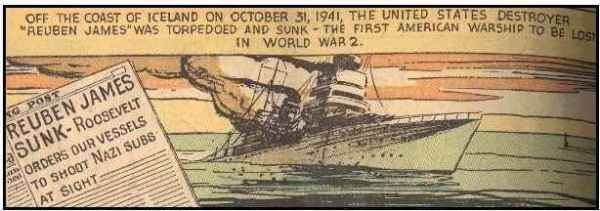
The US destroyer, the USS Reuben James, is torpedoed by German submarine U-552 commanded by Kapitaenleutnant Erich Topp near Iceland. Reuben James had positioned herself in harm's way, between an ammunition ship in a British convoy and the known position of a "wolfpack" (a group of submarines hunting Allied shipping). Of the 159-man crew, only 44 survive. An undeclared war between Germany and the United States has existed since President Roosevelt authorized the use of American naval vessels to escort Lend-Lease convoys bound for Britain. This destroyer is the first US naval casualty.
1946 Death: Max Reinhardt: German film director. From 1902 until the beginning of Nazi rule in 1933, he worked as a director at various theaters in Berlin. From 1905 to 1930 he managed the Deutsches Theater ("German Theatre") in Berlin and, in addition, the Theater in der Josefstadt in Vienna from 1924 to 1933. By employing powerful staging techniques, and harmonizing stage design, language, music and choreography, Reinhard introduced new dimensions into German theater. After the Anschluss of Austria to Nazi-governed Germany in 1938, he emigrated first to England, then to the United States. [For further details, Click here.]
1956 Cold War: British and French troops land in Suez Canal zone:
Two days after Israeli sent forces into Egypt initiating the Suez Crisis, British and French military forces join them in the canal zone to try to retake the canal. Originally, forces from the three countries were set to strike at once, intent on foiling Egypt's plans to nationalize the canal, but the British and French troops were delayed. The entry of Britain and France into the struggle nearly brought the Soviet Union into the conflict, and seriously damaged their relationships with the United States. [For further information, click here]
1961 Stalin's body removed from Lenin's tomb: Five years after Soviet leader Nikita Khrushchev denounced Stalinism and the "personality cult" of Soviet rulers at the 20th Party Congress, Joseph Stalin's embalmed body is removed from Lenin's tomb in Moscow's Red Square. [For further details, Click here.]
Edited by Levi Bookin (Copy editor)
levi.bookin@gmail.com



Click to join 3rdReichStudies



Disclaimer: This site includes diverse and controversial materials--such as excerpts from the writings of racists and anti-Semites--so that its readers can learn the nature and extent of hate and anti-Semitic discourse. It is our sincere belief that only the informed citizen can prevail over the ignorance of Racialist "thought." Far from approving these writings, this site condemns racism in all of its forms and manifestations.
Fair Use Notice: This site may contain copyrighted material the use of which has not always been specifically authorized by the copyright owner. We are making such material available in our efforts to advance understanding of historical, political, human rights, economic, democracy, scientific, environmental, and social justice issues, etc. We believe this constitutes a "fair use" of any such copyrighted material as provided for in section 107 of the US Copyright Law. In accordance with Title 17 U.S.C. Section 107, the material on this site is distributed without profit to those who have expressed a prior interest in receiving the included information for research and educational purposes. If you wish to use copyrighted material from this site for purposes of your own that go beyond 'fair use', you must obtain permission from the copyright owner.
Please Note: The list-owner and the moderator of 3rdReichStudies are not responsible for, and do not necessarily approve of, the random ads placed on our pages by our web server. They are the unfortunate price one pays for a 'free' website.